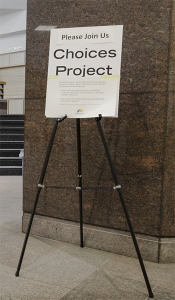‘Choices project’ examines the choices we make and their effects
By Christina Lieffring

Just past the entrance to Yardley Hall, handwritten notes were taped onto a series of bulletin boards. Most of them were anonymous, ranging from the amusing, “Sometimes I don’t know what I want to do with my life and it scares the s**t out of me,” to the painfully earnest; one said they chose to come to the college because their boss committed suicide.
That kind of honesty is not lost on student Theresa Delarosa.
“People are allowing themselves to be vulnerable and write out legit stuff that’s happened to them and that’s really brave of people to do that,” said Delarosa.
Maureen Fitzpatrick, one of the organizers of the project, said she was pleasantly surprised by how honest many of the entries were and the diversity of personalities and experiences they reflect.
“They reflect legitimate choices and the kind of choices that you know we’re faced with; decisions that are both dramatic and seemingly mundane every day,” said Fitzpatrick.
The project was inspired by “The Other Wes Moore,” this semester’s Common Read that examines two men named Wes Moore, their decisions and the consequences of their actions.
“They each make different choices in part because of who they are as individuals, but in part because of the choices that are presented to them in life,” said Fitzpatrick. “And their lives go in drastically different directions.”
It was also inspired by “The Strangers Project,” where a young man asked strangers in New York to share a story from their life with him.
“We walk by hundreds of people every day on this campus,” said Fitzpatrick, “and we have no idea really what’s going on in their lives and what choices they made.”
Reading their fellow counterparts’ submissions can help students relate through their shared experiences.
“It helps people see that other people are going through things too, that they’re not alone,” said student Max Ledom.
Madison Cook was especially moved by a middle-aged woman’s post about choosing to continue her education in order to become a doctor.
“It’s inspiring,” said Cook. “It kind of shows that it doesn’t matter what age you are, you can go back and accomplish something.”
The display was taken down Friday, Oct. 31, but Fitzpatrick hopes it will either become a recurring event or inspire other interactive displays on campus.






















